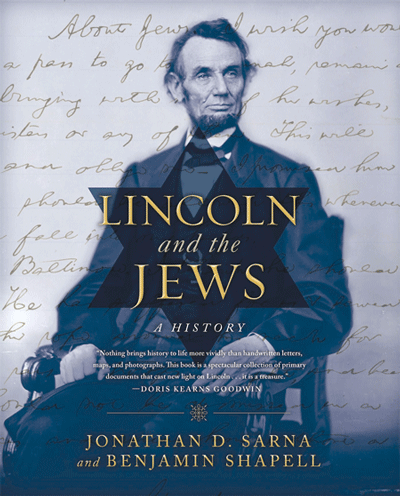Lincoln and the Jews: A History, by Jonathan D. Sarna and Benjamin Shapell, St. Martins, 272 pages, $40
Reviewed by NEAL GENDLER
Abraham Lincoln and the Jews? Who knew?
Jonathan Sarna and Benjamin Shapell enable us to know with a fascinating, beautifully illustrated account of how Lincoln befriended, helped and was helped by Jews — an outsider people, often despised, well into the late 19th century.
“Lincoln would never treat Jews as such, nor would he ever deride them in any of his writings,” the authors say. He “insisted on treating Jews on the same basis as everybody else.”
One Jew, attorney Abraham Jonas of Quincy, Ill., became a lifelong friend who promoted Lincoln at every opportunity and was a major force for his nomination. The authors say Jonas is “the only recorded person… Lincoln ever directly called ‘one of my most valued friends.’”

One of the great virtues of Lincoln and the Jews is that it shows us the letter with those words, as it does scores of other documents, letters and notes in Lincoln’s own hand, as well as information about and photos of Jews involved in Lincoln’s life.
We see that Lincoln wrote unpretentiously, both in language and penmanship. Official documents were signed with both names, but most others show a simple “A.Lincoln.”
Born in Kentucky in 1809, Lincoln knew no Jews until his family moved to Illinois in 1830, but “once he did meet Jews, he displayed no prejudice whatsoever against them — no religious hatred, no antipathy to them as immigrants, no desire to convert them,” the authors say. “To the contrary, the Jews he befriended during his years in Springfield shaped a positive assessment of Jews… He came to know them as neighbors, clients and political allies.”
His closest Jewish friend after Jonas was his chiropodist, the colorful, somewhat mysterious Issachar Zacharie, “a favored family visitor at the White House,” who Lincoln said “has operated on my feet with great success and considerable addition to my comfort.”
Lincoln sent Zacharie on a secret mission to the South to curry favor among Jews for rejoining the Union and to learn of Confederate troop strength and supplies. Zacharie, who gets 21 pages in this book, even talked peace with Judah P. Benjamin, the Confederacy’s secretary of state and its highest-ranking Jew, on Sept. 17, 1863.
All this, and more than I could have imagined there was to know, is told with authority and ease by Sarna and Shapell in a book of coffee-table size, thick pages and a gold place-marking ribbon like that of the Etz Hayim humash. Brandeis professor Sarna is a leading expert on American Jewish history; Shapell, who created the Shapell Manuscript Foundation, has collected for 35 years with particular interest in personality-revealing everyday letters and in Lincoln.
“Lincoln dramatically improved the status of Jews in the United States,” the authors say. “He befriended Jews, defended Jews, and promoted Jewish equality,” both through presidential actions and personal example. Lincoln admitted Jews to military chaplaincy, appointed the first one, and overturned Gen. Ulysses Grant’s order expelling Jewish civilians from conquered areas.
Lincoln commissioned Jews as army officers. About 50 became quartermasters, appointed without reference to their religion except for one chosen specifically because he was a Jew. Lincoln wrote his secretary of war: “I believe we have not yet appointed a Hebrew.” In fact, the authors say, he’d already appointed many.
Lincoln and the Jews is an elegant, scholarly work that’s a joy to read. The only discordant note is the authors’ repeated use of the adjective “inaugural” as a noun.
One fact seems astonishing today: people’s access to the president. They formed a line outside Lincoln’s door to present requests in the manner burdening Moses until Jethro’s advice.
To one, a Christian whose agenda included “restoring [Jews] to their national home in Palestine,” the authors say Lincoln gave “an unequivocal statement that ‘I myself have a great regard for the Jews.’”
Jonas likely “was the first Jew Lincoln came to know well,” and their friendship “was a particularly shaping influence,” the authors say. “Jonas served for him as an enduring model of what it meant to be a Jew.”
***
Neal Gendler is a Minneapolis writer and editor.
(American Jewish World, 3.27.15)



















